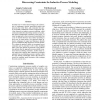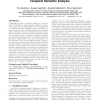76 search results - page 10 / 16 » Discovering Temporal Knowledge in Multivariate Time Series |
DKE
2007
13 years 7 months ago
2007
One of the main factors for the knowledge discovery success is related to the comprehensibility of the patterns discovered by applying data mining techniques. Amongst which we can...
EDBT
2000
ACM
13 years 11 months ago
2000
ACM
Decision tree induction algorithms scale well to large datasets for their univariate and divide-and-conquer approach. However, they may fail in discovering effective knowledge when...
AAAI
2012
11 years 10 months ago
2012
Scientists use two forms of knowledge in the construction of explanatory models: generalized entities and processes that relate them; and constraints that specify acceptable combi...
ICCV
2011
IEEE
12 years 7 months ago
2011
IEEE
We address the problem of learning view-invariant 3D models of human motion from motion capture data, in order to recognize human actions from a monocular video sequence with arbi...
WWW
2011
ACM
13 years 2 months ago
2011
ACM
Computing the degree of semantic relatedness of words is a key functionality of many language applications such as search, clustering, and disambiguation. Previous approaches to c...


